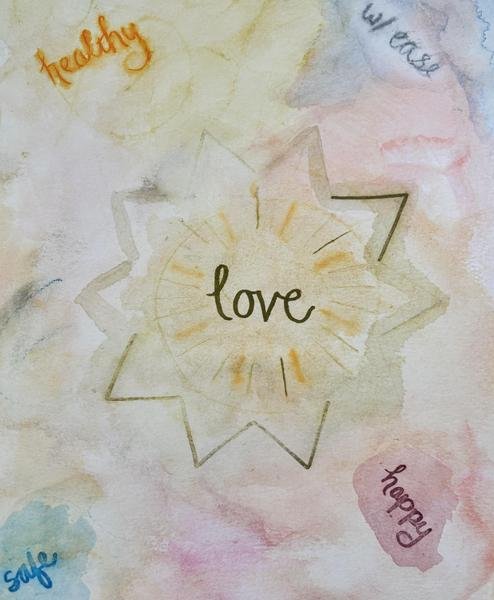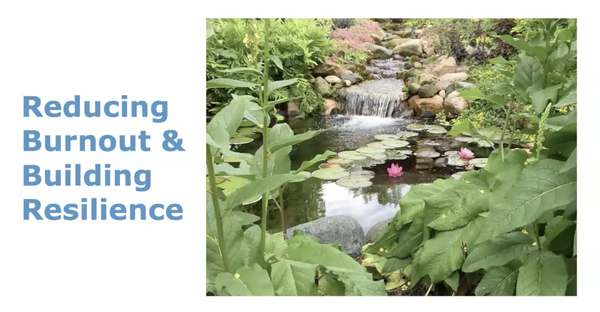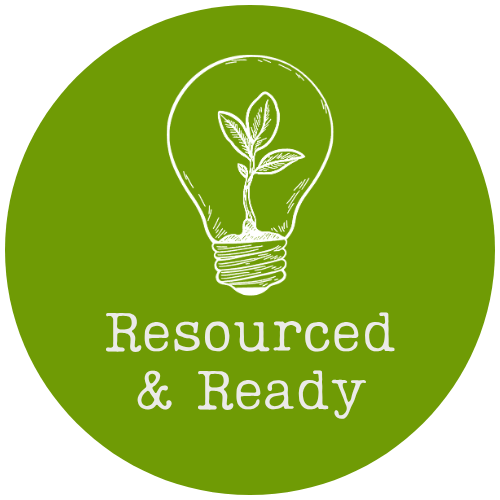It’s time to let yourself off the hook
June 26, 2025
This image highlights key words from Chris Germer's compassionate walking, based on a traditional loving-kindness meditation.
How has your summer been so far?
Are you savoring all the fun you’ve had in June? Or are you beating yourself up for the things you haven’t gotten done?
If you’re like me, you’re prone to the latter and continually working towards the former.
Turns out we're not alone.
In a recent conversation, a close friend revealed that she’d been obsessing over a mistake she’d made at work. Even though the impact was relatively small in the grand scheme, she felt terrible. She admitted that she routinely berates herself: “I can’t tell you how often I waste time thinking about things I should have done differently.”
Man, is that familiar. I've been in that exact spot more times than I care to count—caught in self-criticism, with no obvious way out. I see it often in academia. Many of us set these sky-high standards for ourselves and live in fear of being judged by our peers, our students,… the FedEx guy. We aim for perfection—and when we inevitably fall short, we’re often our own toughest critics.
Today, I invite us to pause and reflect on Cultivating Self-Compassion, the second key from Resourced & Ready: The Ultimate R&R.
Key #2: Cultivating Self-Compassion
When someone’s going through a tough time, just feeling seen and heard can help them heal. Validation means showing up with kindness and without judgment. You don’t have to agree with everything they say—just being there, listening with care, and offering steady support can make a big difference.
We can offer that same kind of support to ourselves. Some people worry that being kind to themselves means making excuses or letting themselves “off the hook”—but research shows the opposite. Self-compassion helps us bounce back faster, stay motivated, and take better care of our health. It builds resilience and strengthens our overall well-being.
Try it out
There are many ways to cultivate self-compassion. Psychologist Paul Gilbert has created a number of practices through his Compassion Focused Therapy and Compassionate Mind Training. Similarly, Kristin Neff and Chris Germer’s Mindful Self-Compassion Program offers many helpful exercises.
Today, though, I invite you to start with just one very basic self-compassion exercise: write a letter to yourself. Research shows that this simple practice can strengthen self-compassion, ease self-criticism, and support emotional well-being—especially when the letter is written as if it’s from a caring friend who listens with no judgment.
There are many ways you can approach writing the letter, and Gilbert’s guidelines are particularly helpful. Here are a few quick tips to get you started. Don’t worry about crafting a perfect letter. Just be open and honest.
Self-Compassion Letter-Writing Suggestions
Describe the situation
Write about what happened gently and honestly.Name your feelings
Acknowledge what you’re experiencing (e.g., sadness, guilt, embarrassment).Remember you’re not alone
Everyone struggles, and everyone makes mistakes.Speak kindly to yourself and offer gentle support
Communicate as you would to a friend who is suffering.Close with encouragement
End with positivity, giving yourself hope for the future.
My friend actually tried this exercise (with some trepidation) and was kind enough to send me a slightly de-personalized version of her letter to share as an example. She mentioned that the exercise was very cathartic, and said it was a good way to reframe how she saw the situation and, in fact, how she saw herself.
Dear Me,
I know you’re still carrying the weight of that mistake at work, the one that completely shook your confidence. I know you strive to do a good job in every aspect of your life. And I know at work, you care deeply about being professional, detail-oriented, and trustworthy.
When you feel like you’ve let others down, it makes you feel sick – your whole body is in pain.
But please remember that you’re human. And humans mess up sometimes.
Yes, your mistake had consequences. And it was hard to face. But you did face it. You took responsibility. You owned up to what happened, even when it would have been easier to sweep it under the rug. You worked hard to make things right as best you could.
Mistakes don’t define you. What is more important is what you do with them. And you showed up immediately with humility and accountability. You learned what not to do in the future. That says more about your character than the mistake ever could.
So please, be kinder to yourself. Allow space for imperfection. It’s ok. You are still the same capable, thoughtful, dedicated person. One mistake doesn’t erase that.
Stop punishing yourself. Let go of your guilt. You’ve already taken the hard, right steps. Now it’s time to offer yourself the same compassion you would give someone else in your shoes.
Remember, you are still a valuable employee and, more importantly, a beautiful, caring person.
With love,
Me
So let's set aside a moment to reflect on how we can increase our own self-compassion, whether by writing a letter to ourselves, taking a self-compassion break, or one of countless other options. It's not about doing the perfect thing. It's about giving ourselves the space to explore and grow.
By offering ourselves the same care and understanding we’d give a friend who is hurting, our inner voice becomes kinder. And couldn't we all use a little more kindness these days?
As always, thanks for being here, and thanks for being you!
With love and gratitude,
Elizabeth
Struggling with feelings of overwhelm? The Reducing Burnout & Building Resilience Workshop may be for you. In this free pre-recorded workshop, we dive deeper into these experiences, and explore small steps to improve our well-being.
This workshop was given as part of the STANDOUT Professor Confab. Our Summer 2025 Confab has ended, but stay tuned for information about future sessions!
Whether you’re feeling empowered and energized or overwhelmed and exhausted, Resourced & Ready: The Ultimate R&R provides keys to finding balance and building resilience. I hope you’ll return to it often as you continue to navigate this uncertain terrain.
To support that process, I’ll be digging into a different key in each of my upcoming newsletters. We’ll explore the core concepts and consider simple ways to put them into practice. First up is Building Awareness. Why not get a jump start by taking 60 seconds to simply pause and notice what’s happening in your mind and body? No judgment allowed. Only curiosity and learning.


